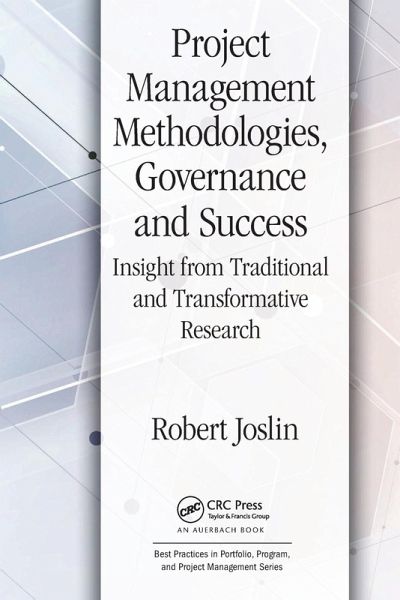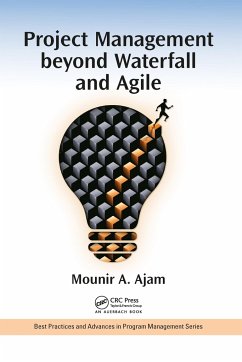
Project Management Methodologies, Governance and Success
Insight from Traditional and Transformative Research
Versandkostenfrei!
Versandfertig in 6-10 Tagen
48,99 €
inkl. MwSt.
Weitere Ausgaben:

PAYBACK Punkte
24 °P sammeln!
With all signs pointing to an increased use of and interest in project-based work in modern organizations, the better scholars are able to make sense of the current state of the field through theory development and empirical investigation, the more successful projects promise to become. This book is a welcome addition to our field and will be, I am sure, an important work and source for future reference well into the future.-Dr. Jeffrey Pinto, Pennsylvania State UniversityThe goal of practicing project managers and scholars alike lies in solving the puzzle of how to manage projects toward succ...
With all signs pointing to an increased use of and interest in project-based work in modern organizations, the better scholars are able to make sense of the current state of the field through theory development and empirical investigation, the more successful projects promise to become. This book is a welcome addition to our field and will be, I am sure, an important work and source for future reference well into the future.
-Dr. Jeffrey Pinto, Pennsylvania State University
The goal of practicing project managers and scholars alike lies in solving the puzzle of how to manage projects toward successful completion. However, understanding what comprises project "success"-seemingly such an innocent question-has come to represent one of the most challenging problems for project managers and scholars. Who determines success? At what point in time is success best measured? How do diverse stakeholders define success? What happens when their perspectives collide? What is the difference between project success and project management success? These are surprisingly complex problems. For every principle or rule posited, a brief investigation reveals that there are numerous exceptions, muddying the waters and making these ideas increasingly opaque. Project Management Methodologies, Governance and Success addresses this challenge head-on, putting into proper context the critical issues that shape our understanding of the project management research process.
Employing a concept referred to as "philosophical triangulation," the book shows how to overcome the weaknesses or intrinsic biases that disrupt and minimize the impact of so much organizational research. It places organizational governance and success within their proper context allowing scholars to identify the best methods for investigating project-based work. It links together in a cogent manner the diverse themes of research theory and design, projects and project success, and organizational governance. In effect, this book demonstrates that to fully understand how to undertake research in projects, theory and method are inextricably interwoven.
-Dr. Jeffrey Pinto, Pennsylvania State University
The goal of practicing project managers and scholars alike lies in solving the puzzle of how to manage projects toward successful completion. However, understanding what comprises project "success"-seemingly such an innocent question-has come to represent one of the most challenging problems for project managers and scholars. Who determines success? At what point in time is success best measured? How do diverse stakeholders define success? What happens when their perspectives collide? What is the difference between project success and project management success? These are surprisingly complex problems. For every principle or rule posited, a brief investigation reveals that there are numerous exceptions, muddying the waters and making these ideas increasingly opaque. Project Management Methodologies, Governance and Success addresses this challenge head-on, putting into proper context the critical issues that shape our understanding of the project management research process.
Employing a concept referred to as "philosophical triangulation," the book shows how to overcome the weaknesses or intrinsic biases that disrupt and minimize the impact of so much organizational research. It places organizational governance and success within their proper context allowing scholars to identify the best methods for investigating project-based work. It links together in a cogent manner the diverse themes of research theory and design, projects and project success, and organizational governance. In effect, this book demonstrates that to fully understand how to undertake research in projects, theory and method are inextricably interwoven.














